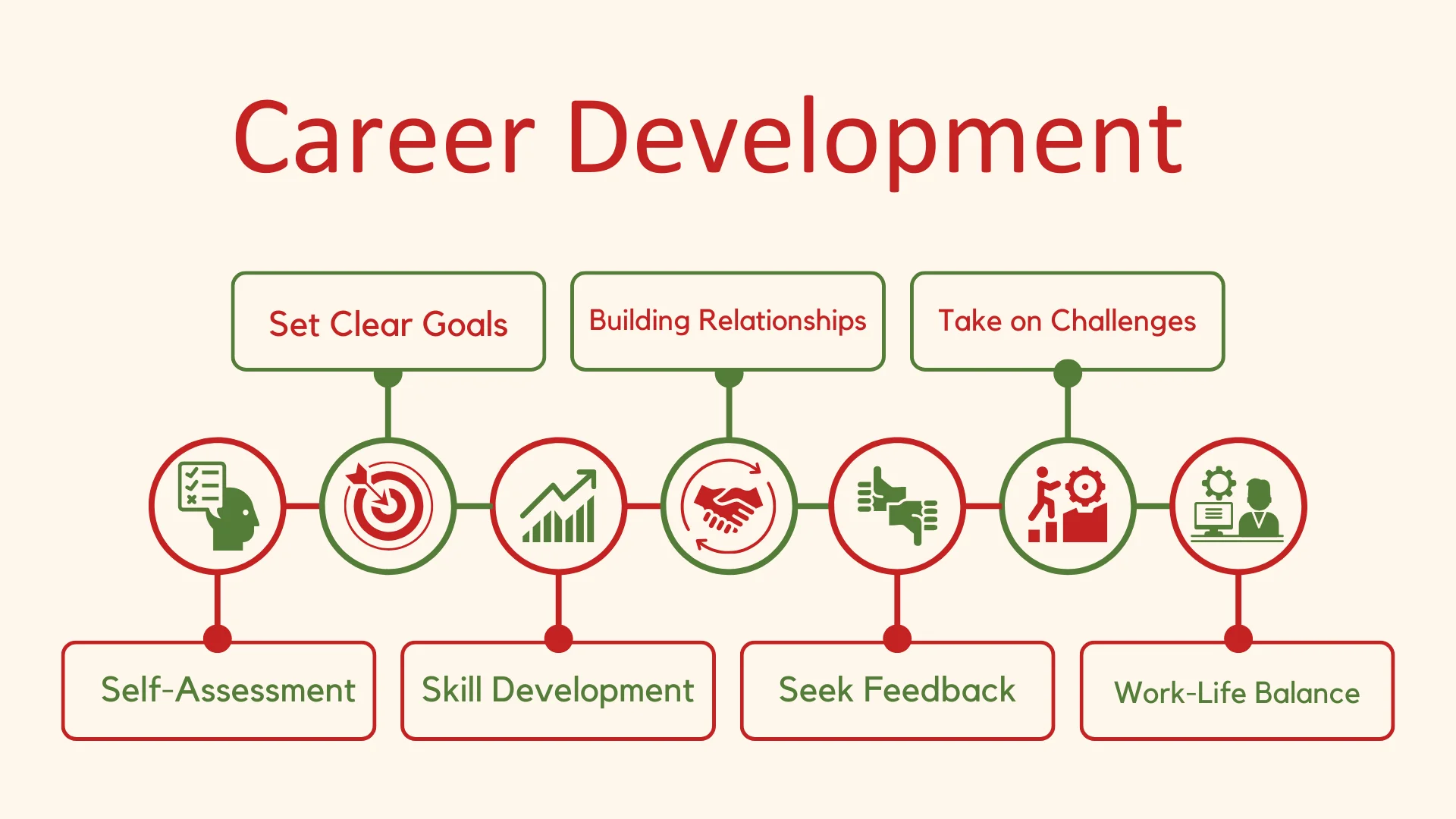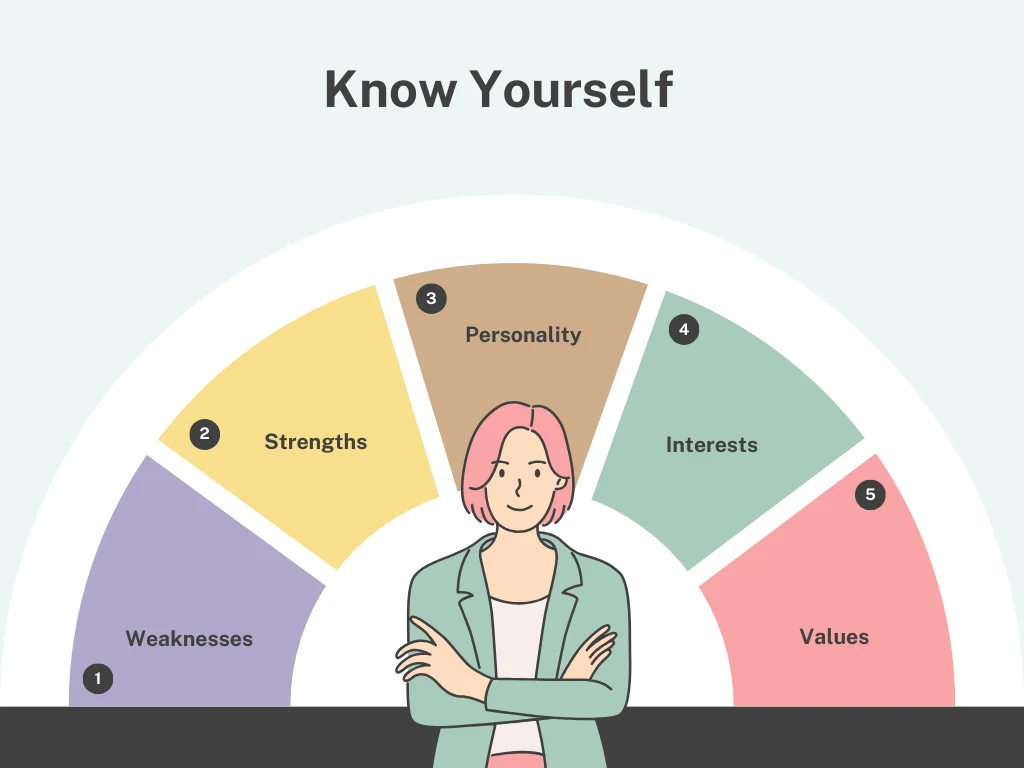Considering a career change or just starting your professional journey? Career development is the ongoing process that determines your work satisfaction over the course of your life. Whether you are 22 or 52, understanding this process is key to discovering work you find genuinely rewarding.
As a career Expert with over 3+ years of experience, I’ve guided hundreds of clients through productive career transitions. In this comprehensive guide, I’ll define exactly what career development entails and provide actionable steps to help you achieve your career goals, realize your potential, and lead a more meaningful work life, on your own terms.
Table of Contents
What IS Career Development
Career development describes the journey of navigating your professional life purposefully over time. It involves actively managing your career to achieve the knowledge, skills, network, resilience, identity and purpose that enables you to carve out work you find satisfying. This requires understanding your talents and values, exploring possibilities that align with them, setting career goals, and undertaking the necessary steps to meet those ambitions.
Everything you need to succeed is already inside you – you just have to access your inner-power and make it happen.
Career development is proactive, not passive. It is a recurring process of self-assessment, planning, goal-setting and skill-building required to conquer new career milestones.
Take a Look at below Image
This process empowers you to evolve in your working life, avoid stagnation in unfulfilling jobs, and construct specialized knowledge to tackle new professional challenges. With dedication throughout your working life, career development enables you to discover stimulating work where you can apply your gifts productively and thrive financially, socially, and psychologically.
Why Invest in Career Development?
I know Constructing a rewarding career takes effort and time. However, the personal benefits of career development are immense:
- Find work you’re passionate about that provides a sense of meaning and enjoyment. The average American spends 90,000 hours (varies depending on countries and companies) at work in their lifetime – that’s too long to be disengaged or unsatisfied!
- Meet financial goals that enable you to live the lifestyle you want. Select a career path that leverages your talents and offers ample advancement opportunities.
- Gain knowledge and marketable skills that prevent your abilities from becoming obsolete over time as industries evolve.
- Build specialized expertise that is valued and well-compensated
- Establish professional connections that open doors and provide insider access to unlisted job opportunities
- Discover new interests and talents you may not have tapped into yet. Your capabilities are far more extensive than you realize!
- Remain resilient in face of industry disruption and economic instability. You can pivot your experience to adjacent roles.
- Improve self-confidence through accumulating achievements over the course of your work history
By dedicating yourself now to intentional career development, you set yourself up for decades of purposeful, engaged and dynamic work that offers new challenges to conquer and milestones to celebrate.
Career Development Steps
Constructing a rewarding career is a layered process that requires forethought and effort. Here are actionable steps to launch your career development journey.
| Career Development Step | Description |
|---|---|
| Know Yourself | Identify your personality, strengths, weaknesses, interests and values |
| Assess Your Skills | Inventory your current hard and soft skills, identify gaps |
| Explore Career Options | Informational interviews, job shadowing, volunteering, interning |
| Choose a Direction | Synthesize learnings to pick an aligned career path |
| Set Achievable Goals | Start small, build on accomplishments |
| Keep Learning | Expand skills/knowledge continually |
| Stay Resilient | View obstacles as learning opportunities |
Step 1. Know Yourself
The foundational step is identifying your talents, interests and values to determine suitable work environments and job roles.
- Personality: Are you more introverted or extroverted? Detail or big-picture oriented? These innate traits impact your work preferences.
- Strengths: What natural talents do you possess? Are you creative, analytical, organized or persuasive? Leverage these gifts.
- Weaknesses: Being aware of shortcomings allows you to avoid roles not well suited or address gaps through training.
- Interests: What topics and activities energize you? Seek roles involving exploration of these passions.
- Values: What gives work meaning for you? Income level? Creativity? Stability? Influence? Align roles accordingly.
Step 2. Assess Your Skills
Take stock of your expertise as well as gaps requiring development.
| Skill Area | My Current Ability Level | Is This a Gap? | Strategies to Improve |
|---|---|---|---|
| Coding | Beginner | Yes | Take online course |
| Public Speaking | Intermediate | Somewhat | Join Toastmasters |
| Project Management | Advanced | No | Maintain through work projects |
- Start by inventorying your hard and soft skills. This includes education, technical abilities like data analysis or coding,written and verbal communication talent, project management, etc.
- Identify glaring skill deficits that may curb your employability for desired positions. Make strengthening these a priority through classes, volunteer work, or online training.
- Research required abilities for aspirational roles several years from now. Slowly build these through side projects or continuing education.
Step 3. Explore Career Options
Equipped with self-knowledge, get exposure to promising fields and specific jobs that enable you to apply your talents toward what captures your interest.
- Informational Interviews: Reach out to friends-of-friends with exciting careers to better understand their roles and industry. Ask about skills needed, job trajectory, lifestyle impact, challenges and rewards.
- Job Shadow: Spend half a day observing someone in a career of interest. Get a feel for day-to-day reality. Is this appealing long-term?
- Volunteer: Donate a few hours per week with a local organization aligned to careers worth exploring to test your affinity while making community impact.
- Internships: Seek short summer internships allowing immersive trial of intriguing industries, companies or jobs giving great insight into culture and requirements before full-time commitments.
- Conferences: Attend professional association events to connect directly with leaders in emerging fields. Discuss latest industry trends and innovations.
Step 4. Choose a Direction
After gathering insight from exploration, synthesize learnings to choose a career direction aligning with passions and talents that promises Personal fulfillment. Commit to this path while remaining open to course correcting as you continue gaining wider exposure.
Step 5. Set Achievable Goals
Career advancement requires incremental goal-setting and purposeful steps to arrive at major milestones.
- Start where you are. Set small goals with realistic timelines that stretch your abilities without overwhelming. Achieve these through diligent effort.
- Build on accomplishments through sequentially bolder objective-setting. Allow each achievement to expand your vision of what is possible. Mastery inspires motivation.
- While goals should be ambitious, they must be measurable and bounded by concrete deadlines. Define specific actions needed to reach them. Hold yourself accountable through regular progress checks.
Step 6. Keep Learning
Working life progresses through the continual expansion of skills and knowledge. Stagnation leads to obsolescence.
- Dedicate consistent time to learning. Read industry blogs, listen to career-focused podcasts, take evening classes, attend conferences, and more. Savvy professionals never stop acquiring wisdom.
- Maintain networks that expose you to emerging industry trends, best practices or new methodologies you should integrate. Surround yourself with talented peers that compel you to raise your game.
- Get comfortable being uncomfortable. Once mastery sets in, seek unfamiliar roles and responsibilities that stretch your experience. Discomfort is the preamble to growth.
Step 7. Stay Resilient
An abundant career involves weathering setbacks and skillfully navigating change. Resilience powers perseverance.
- View obstacles as learning opportunities strengthening your grit and ingenuity. Each challenge makes you more battle-tested to handle the next.
- Similarly, industry changes keep you nimble, curious and anti-fragile as you add strings to your bow. Seek jobs involving variety in focus areas, roles and required abilities over pure specialization.
The Takeaway
Career development is a lifelong process of gaining self-awareness, exploring possibilities, setting dynamic goals and acquiring skills enabling you to craft work aligned with your talents and passions that meets financial and psychological needs.
By dedicating effort toward intentional career management – knowing yourself, expanding knowledge, building connections, and leveraging transferable skills – you gain agency in discovering purposeful work over the decades-long arc of your professional life, on your own terms.
We offer exclusive one-on-one career counselling and coaching programs personalized to your distinct abilities, interests, and ambitions. If you seek individualized guidance focused on accelerating your career growth through proven strategies and accountability, request a free consultation call using our contact form.

